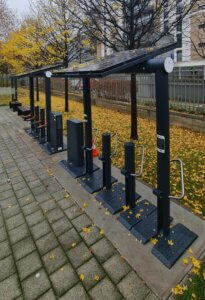As cities like Warsaw embrace the micromobility revolution, more employees are commuting with e-bikes and e-scooters. Yet without solar powered e-bike and e-scooter charging solutions, many office buildings have not adapted their infrastructure. Restrictions on bringing scooters and bikes inside, often due to safety or space, discourage sustainable commuting and create a gap between ESG commitments and employee reality.
At Seedia, we recognised this challenge and partnered with AstraZeneca Warsaw to deliver a tailored solution: a secure, solar-powered charging station designed specifically for workplace commuters.
 Closing the ESG Gap With Smart Micromobility Infrastructure
Closing the ESG Gap With Smart Micromobility InfrastructureThe installation is far more than a simple charging point. It is a complete electromobility infrastructure, fully powered by renewable energy and seamlessly integrated with the company’s existing systems. Employees gain access with their RFID cards, ensuring that only authorized users can park and charge their devices safely. By moving charging activity out of office corridors and into a dedicated outdoor space, AstraZeneca created a structured and secure environment for its growing community of micromobility commuters.
This solar-powered charging station also supports AstraZeneca’s ESG goals. Seedia provides quarterly reports on station usage, carbon footprint reductions, and other measurable sustainability indicators. These data-driven insights help the company track progress, adjust commuting policies, and strengthen its environmental reporting. By reducing reliance on grid electricity, the installation further reinforces AstraZeneca’s commitment to clean energy and sustainable innovation. For employees, the integrated locking and charging mechanisms also provide reassurance that their e-bikes and e-scooters are protected from theft or misuse — a growing concern in dense urban office areas.
For businesses, the benefits of investing in charging stations and micromobility infrastructure extend well beyond convenience. They send a strong signal to employees, investors, and regulators that sustainability and innovation are not just slogans, but actionable commitments. As ESG reporting standards tighten across the EU, solar-powered charging stations offer companies a measurable way to cut commuting-related emissions, improve the employee experience, and align with broader smart city goals.
The AstraZeneca Warsaw project shows how scalable this model is. Seedia’s modular charging points can be deployed across office campuses, corporate headquarters, or technology parks in Poland and internationally. By combining renewable energy, integrated access control, and smart data reporting, our stations transform office buildings into active participants in the green mobility transition.
Electromobility is not a distant vision — it is happening now. Companies that invest in e-bike and e-scooter charging infrastructure are not only supporting sustainable commuting but also future-proofing their workplaces for a generation that values climate action, convenience, and innovation.
Learn more about our Seedia charging solutions and how we can help your company meet ESG goals.